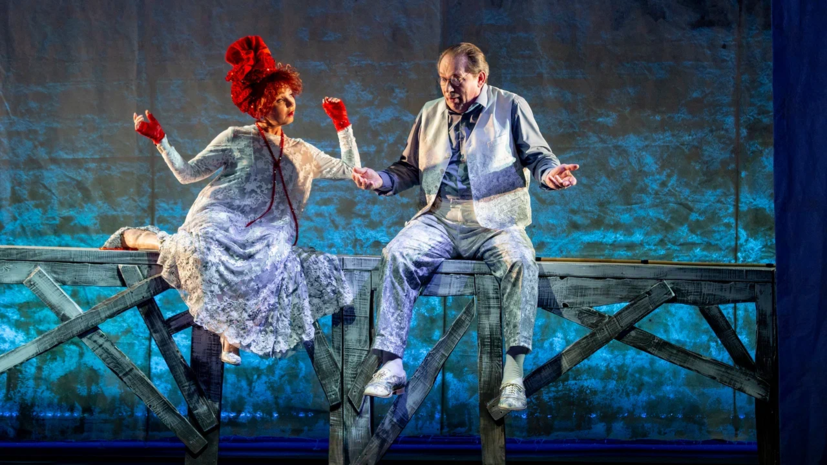On Friday, March 17, on the stage "Under the Roof" of the Mossovet Theater, the premiere of the production "Old Fashioned Comedy" will take place, directed by Vladimir Skvortsov, and the main roles are performed by Honored Artists of Russia Irina Klimova and Vladimir Maisinger. The rethinking of the classic Soviet play acquired a mystical component - it successfully complemented the incredible game of the central duo of artists and added emotions and reasons for reflection to the audience.
"Old-fashioned comedy" both in the original and in the film version of Era Savelyeva and Tatiana Berezantseva (1980), in which the main roles were played by Alisa Freundlich and Igor Vladimirov, are chamber stories built not on spectacular scenery or backgrounds, but solely on the charisma of the artists and their ability to keep the attention of the audience. Klimova and Maisinger in Skvortsov's production coped with their task brilliantly - their characters are so felt and superbly performed that there is no suspicion that the actors only play their roles. The viewer in the same intimate setting sees Lydia Vasilyevna and Rodion Nikolaevich, who met in a sanatorium on the Riga seaside.
The minimalistic design of the scene in this case is more of an advantage than a disadvantage - nothing distracts from the story and the play of the actors. The character of Irina Klimova several times during the performance arranges a kind of interactive with the audience (so for the most devoted fans there is a reason to think about purchasing tickets for the first row), and Vladimir Maisinger also does not ignore the audience.
The main part of the original story is not just preserved, but reproduced almost verbatim - Lydia Vasilyevna Gerber, an eccentric lady no longer even of Balzac's age, with a rich life experience full of personal tragedies, comes to be treated in a sanatorium. But the bright nature (in the past Gerber is an actress of the drama theater, and in the present - a circus worker) and a flighty character become the reason for a conflict with the head doctor of the institution - Rodion Nikolaevich, a sedate, solid and well-mannered man of 59 years, whose life was also far from idyll - in his youth and youth he went through two wars, on the second he lost the love of his life.
Gerber breaks the order of the sanatorium, which is why neighbors complain about her. Rodion Nikolaevich tries to restore order in the territory entrusted to him, but fails: Lydia Vasilyevna seems not just uncontrollable, but creates the impression of being slightly blissful. To recognize where, when, and most importantly - why she lies is beyond her power even herself, as well as to realize the causes and consequences of some of her actions, which the heroine herself will say towards the end of the performance.
Special praise deserves the remarks, the appeals of the characters to each other and the speech turns in general - absolutely authentic USSR period 1950 - 1960s. The images and speech of the characters perfectly complement the simple, but thoughtful costumes in which the actors change in a matter of moments. High-quality sound, coupled with competent work of lighting designers, also help to immerse yourself in the atmosphere.
- © Elena Lapina / Mossovet State Academic Theatre
The director brought mysticism to the play, which at first glance seemed to be another reading of a classic play. Until the end of the performance, it is quite difficult to understand what kind of young people appear in this or that scene, what kind of figure in a scarlet hoodie, resembling the Gloomy Reaper, tries to take with him either Rodion Nikolaevich or Lydia Vasilyevna, that for strange ghosts without faces make up the retinue of a mysterious character.
Based on a few mentions (and the young actors have very few lines) and what happens to them on stage, we can assume that in fact the time of action is far from the middle of the last century, but rather the end. And the main characters are ghosts who linger in this world because of their tragedies and losses. The scenes where they take turns saving each other from the reaper are not deliverance from death, but only an unwillingness to leave this world where they are held by too much. After all, who but Rodion Nikolaevich will carry flowers to the grave of his long-dead wife every day? Who will mourn the only son of Lydia Vasilievna, who was killed in the war?
"How strange life goes," says Gerber. "There's so much wealth around and you're passing."
The fact that these characters eventually came together takes on a very different meaning, quite strikingly different from the original production, despite the almost verbatim reproduction of its text. Nevertheless, such a reading does not detract from the merits of the "Old Fashionable Comedy", and the new inserts, if desired, can simply be ignored, focusing on the incomparable play of the artists and the beautiful story about the loneliness and new happiness of two seemingly completely different people.

